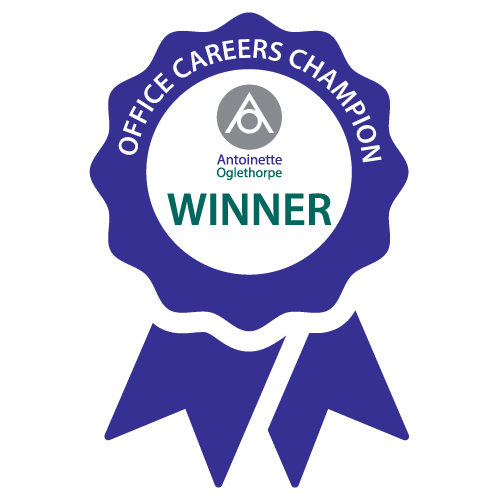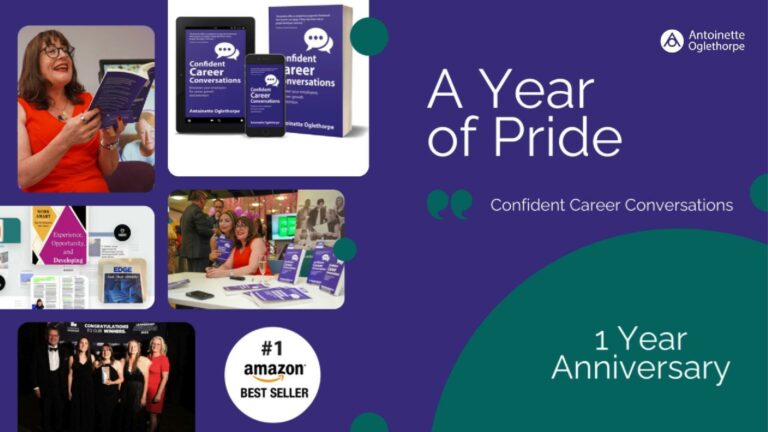Earlier this year we ran the first of our Office Careers Champion Awards to find the heroes out there championing and developing careers. Our aim was to recognise and celebrate the unsung Office Career Champions who make a real difference to businesses and careers every day.
Our very worthy winner was Patrick Gribben of Intouch Accounting. Through his successful nomination Patrick won a half-day Confident Career Conversations Workshop for him and 12 colleagues plus a Career Conversation toolkit for every participant. After our workshop I caught up with Patrick to find out a little more about him and his contributions careers within his organisation.
Antoinette: Firstly, congratulations on being nominated and of course being selected as our winner of the office careers champion competition. How did it feel to be recognized and praised by your colleagues?
Patrick: It was really, really lovely. What I took away from this was the understanding of what my work meant to people here and to their lives and the development of their careers. After all, our career is really a central part of, of what we do as people throughout our adult lives. So yes, it’s lovely to be nominated in the first place, but even more lovely to win. Everybody at Intouch Accounting has benefited to a lesser or greater degree from the work that we’ve done over the last 12 to 18 months. I can only see that continuing as we refine what we do.
Antoinette: Can you tell us a little bit more about your role within the organisation?
Patrick: My job title is Head of Client Services. I am responsible for a team of 22 people who, support and deliver our services to 2,700 clients. So, customer service and experiences is at the forefront of everything that we do. The way for us to deliver the best service possible to our clients is to have a consistently good team of people. You can only start to do that if you’ve got a team of people that have been in the industry or more predominantly within our business for a long period of time. So, it’s important that we address any staff attrition issues. We do that by looking at what’s likely to affect their desire to be here longer. And in a nutshell that’s really what I do. Staff retention is at the heart of what we do here. You mentioned addressing attrition issues and that your focus is on keeping people.
Antoinette: Am I right in thinking that you had a few problems with that before the last 12 to 18 months?
Patrick: I’d been with the business for a couple of years, within that time we’d probably seen more than a hundred percent staff attrition. There were maybe only four or five people who’d been in the business longer than I had. Some of the problems that we were facing were around people not having a genuine idea of how their career could develop and progress.
Antoinette: So what is your staff turnover like now?
Patrick: We’ve only had one person resign and he resigned to follow a lifelong dream of starting his own business. We’ve not lost anybody because they don’t know where their career is going, what’s required from them to achieve that, what support is available from the business or because they felt that the leadership of the business wasn’t going to operate in a way that benefited them.
Antoinette: Can you talk us through what you’ve done in the last 18 months that has created that such a transformational journey for the organisation?
Patrick: Firstly we restructured the department to bring together the service delivery and the service support functions. We had was we had a bit of an us and them culture between these two functions and they weren’t aligned as services. So one of the first things I did was change the structure of the service delivery team adding more layers to that team. We’ve now got four levels and each one of those levels is banded. These layers created a career path that people can follow and they can see just by looking across the room what that looks like in terms of role and responsibilities.
The next step to that then was to build some relationships between individual people across those layers, so I set up a mentoring scheme where our senior personal accountants have a direct relationships with our service delivery people and they have regular meetings to discuss personal, professional, and technical developments. Address any blockers or barriers that might be in the way of those developments.
That then feeds into our Personal Development Initiative process, which was brought in, in October of last year. The initial PDI that sets objectives and then quarterly reviews against those objectives for the next quarter.
Writing and reviewing all our job roles was also key. So what does somebody need to be able to learn, exhibit, and develop in terms of skills and knowledge to make them eligible for the next most senior role in the business. Building those connectors between each of the job specs, we started to think about this in terms of career progression steps, each of those steps became a progression marker.
What we’ve ended up with is a passport system. So on the first day in the office, somebody gets their own physical copy of an “Inprogression Passport”. They can see where they are now in their current job role, they can look forward and see the six most important things they need to have for the next level. They’re personal objectives are aimed at helping them complete these markers. We also have our wider mentor piece, which looks at some of the softer skills.
Antoinette: I love the passport idea. How have you managed the risk of someone getting all their stamps, but for some reason may still not quite ready, or the opportunity doesn’t just doesn’t exist?
Patrick: We managed that really early on by discussing with people that this is designed to help identify areas where you can progress and help us identify ways in which we can support you in doing that to benefit your career in the longer term. In the short term, medium term, the aim is that you earn the right to promotion but any promotion has to be justified by the business performing and growing as we expect as well.
What it has done is it’s given us the opportunity to speak with people and start meaningful conversations with them about their careers. We’ve identified people who have been with us for a long time, understand their career development desires and helped them progress and take on new responsibilities. For those who have progressed they are much more driven in their work.
On the flip side, it’s enabled us to have proper conversations with people who are really keen to be promoted, but just aren’t ready for it. We can have a really structured conversation with them about why they’re not ready without there being any emotion involved. They have a clear guide to the things they need to achieve and this is how long it’s going to take. It’s helped us bring people on but also manage expectations.
Antoinette: In terms of the mentoring that you mentioned, how does that happen?
Patrick: So we selected the pairings initially, I sat down with the two operations managers, Neil Kellaway, Chris Deakin to discuss who would be best suited. Those relationships have worked really, really well. We will be changing those relationships and pairings up to give everyone the benefit of experiencing different mentoring styles, different ways of approaching things, and different levels of experience. I think that that will benefit the mentees and the mentors as well. It benefits the mentor as they learn from their interactions with different people and they’ll face different challenges. They’ll come across different ways of thinking, different blockers and then need to think creatively to overcome those.
Antoinette: That’s a really important point, I think there is a myth that people think a mentoring relationship is like a marriage and that’s it for life. It’s actually a development initiative and therefore you should have a fixed end point for review. Accessing have people got what they need from that relationship, what value has been gained? It’s then time to reflect again on what they may need now and therefore who is the new best person to provide that support.
So we can’t take any credit for this, these wonderful initiatives that have taken place in Intouch Accounting because you, you weren’t a client of ours. However you did win our career conversations workshop as a result of you doing brilliant things you’ve been doing. Having had that session recently can you tell us a bit about what your experience of that was like.
Patrick: The Careers Conversations Workshop was fantastic. I loved the workshop and had nothing but positive feedback from the participants. We very quickly identified that people were taking a lot from it. For all of us it enabled us to start to think about those conversations in a different way. I absolutely loved the positive angle of the types of questions to ask. Helping people think about reasons why they’re in the position they are now, reflecting on what they’ve done that’s benefited the them of today. As a species, I think we’re hard wired to think negatively because that’s what’s protected us. Changing this mindset and helping your team to think about the positive causes to their success today and enabling them to say I’m really good at this. It’s amazing conversation because once people start talking about themselves it’s often quite difficult to stop them. Actively listen and take on board what people are saying, then you’ll definitely discover new things.
Antoinette: Have you had the opportunity to have many career conversations since the workshop?
Patrick: Absolutely. So one of the participants that I was paired up with initially, I’ve had a couple of conversations with him since and we’ve used the techniques that we learned from the course. They’ve hugely benefited our relationship and our understanding of each other. That’s helped us move things on, understand where he wants to go and highlight a things that he needs to do to get himself there. It has helped him understand it’s about him taking ownership of managing his own career. This is particularly interesting because this wasn’t a new relationship, we’ve worked together for three years. So this new way of thinking helped us find out new things about each other.
Antoinette: Often when we think about career development, we only think about the future and we don’t actually recognise that there’s a lot we can learn from reflecting on the past. And you’ve obviously got to know more about each other as well as possibly yourselves through having those reflections and those conversations.
Patrick: Absolutely. The two of the main messages I took away from the careers conversation workshop were using positivity biased questions. Getting your people thinking about their achievements and wins and what that means moving forwards. So thinking about when you’ve achieved something, what your mindset was, and how you achieved that. The second is that career conversations don’t have to be structured. That you don’t have to have a formal meeting. It could be just sat next to each other or it could be at a water cooler. Those impromptu five minutes informal discussions can be really impactful.
Antoinette: What’s next then for career development at in Intouch Accounting Patrick?
Patrick: We are now into the norming phase where the “Inprogression” and career conversations process becomes the norm for employees who were at Intouch before the changes. This is also where we prove to those same people that the structure and tools work, by helping them manage their own development by accessing support in a guided way. New joiners are inducted into the business in a guided way, learning about who we are and what we do, and also about the career opportunities that are available to them. Adopting the “Inprogression” process and having regular constructive career conversations, becomes the new normal.
Antoinette: If you could give one key piece of advice to any company embarking on a career development initiative, what would it be?
Patrick: My one piece of advice to any company embarking on a career development initiative is to care. It’s important to show that you care about someone on a personal level, about their future and are invested in finding ways to support them in managing their own career development. Psychologically, once you’ve decided that something is important to you (and the development of people and talent should be) then it becomes a priority.
Antoinette: Thanks a lot for your involvement with all this. It makes a brilliant case study and is very deserving of your Career Champion status.
Patrick: You are so welcome Antoinette, I’m discovering that I’m quite passionate about people so thank you for being part of helping me realise that.
If you would like to find out more about creating a culture of career development in your organisation and empowering your employees to take ownership of their careers, please get in touch or take a look at the careers services we can offer.
or take a look at the careers services we can offer.



